一般将来时用法
一般将来时用法总结
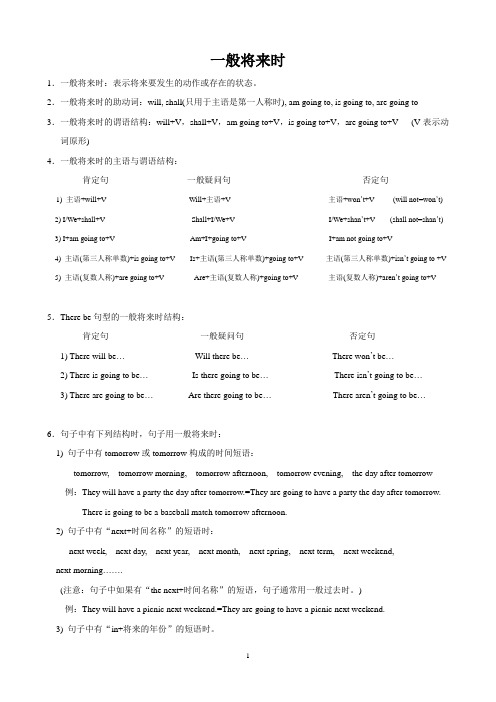
一般将来时1.一般将来时:表示将来要发生的动作或存在的状态。
2.一般将来时的助动词:will, shall(只用于主语是第一人称时), am going to, is going to, are going to3.一般将来时的谓语结构:will+V,shall+V,am going to+V,is going to+V,are going to+V (V表示动词原形)4.一般将来时的主语与谓语结构:肯定句一般疑问句否定句1) 主语+will+V Will+主语+V 主语+won’t+V (will not=won’t)2) I/We+shall+V Shall+I/We+V I/We+shan’t+V (shall not=shan’t)3) I+am going to+V Am+I+going to+V I+am not going to+V4) 主语(第三人称单数)+is going to+V Is+主语(第三人称单数)+going to+V 主语(第三人称单数)+isn’t going to +V5) 主语(复数人称)+are going to+V Are+主语(复数人称)+going to+V 主语(复数人称)+aren’t going to+V5.There be句型的一般将来时结构:肯定句一般疑问句否定句1) There will be…Will there be…There won’t be…2) There is going to be…Is there going to be…There isn’t going to be…3) There are going to be…Are there going to be…There aren’t going to be…6.句子中有下列结构时,句子用一般将来时:1) 句子中有tomorrow或tomorrow构成的时间短语:tomorrow, tomorrow morning, tomorrow afternoon, tomorrow evening, the day after tomorrow 例:They will have a party the day after tomorrow.=They are going to have a party the day after tomorrow.There is going to be a baseball match tomorrow afternoon.2) 句子中有“next+时间名称”的短语时:next week, next day, next year, next month, next spring, next term, next weekend,next morning…….(注意:句子中如果有“the next+时间名称”的短语,句子通常用一般过去时。
一般将来时态用法

一般将来时态用法一般将来时表示在将来某个时间要发生的动作或存在的状态。
一. 一般将来时的基本用法:表示“纯粹的将来”:①表示将要发生的动作或情况,常带有表示将来的时间状语,如tomorrow, next week, in two days, from now on 等。
如:It will be fine tomorrow. 明天天气晴朗。
②表示预料将要发生的动作或情况。
如:You will feel better after having this medicine. 吃了这药,你就会感觉好些的。
二. 一般将来时的构成:1. 由助动词“ shall/ will +动词原形”构成,shall 用于第一人称,will 用于第二、第三人称,而美式英语在陈述句中无论什么人称,一律用will. 表示“带有情态意义的将来”,用来表示意图,用will 来表示。
如:I will be more careful next time. 下次我要更加小心。
I won't go shopping this afternoon, but she will. 今天下午我不想去购物,但她想去。
2. will 在疑问句中,用来表示有礼貌地征询对方的意见。
如:Will you have some more tea 要不要再喝点茶What shall we do this weekend 本周末我们要干什么3. 一般将来时的否定和疑问形式:一般将来时的否定形式是will not ,缩写为won't; shall not ,缩写为shan't 。
一般将来时的疑问形式是把will/ shall 提到主语前。
如:He won’t go to th e park this Sunday. 本周日他不去公园。
Will you go swimming with me 和我一起去游泳好吗4. shall只用于第一人称,如用于第二、第三人称,就失去助动词的意义,已变为情态动词,试比较: He shall come. 他必须来。
完整版)一般将来时基本用法
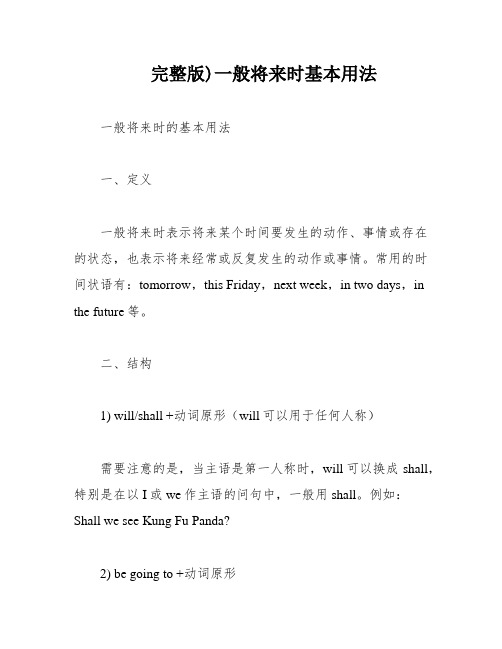
完整版)一般将来时基本用法一般将来时的基本用法一、定义一般将来时表示将来某个时间要发生的动作、事情或存在的状态,也表示将来经常或反复发生的动作或事情。
常用的时间状语有:tomorrow,this Friday,next week,in two days,in the future等。
二、结构1) will/shall +动词原形(will可以用于任何人称)需要注意的是,当主语是第一人称时,will可以换成shall,特别是在以I或we作主语的问句中,一般用shall。
例如:Shall we see Kung Fu Panda?2) be going to +动词原形例如:I’m going to play the piano。
be going to和will的区别be going to和will的用法虽然都表示将来发生动作或情况,一般情况下能互换。
但它们的用法是有区别的。
be going to主要用于:1、表示事先经过考虑、安排好打算、计划要做的事情。
例如:Dad and I are going to watch an opera this afternoon.2、表示根据目前某种迹象判断,某事非常有可能发生。
例如:Look。
There come the dark clouds。
It is going to rain.三、一般疑问句和否定句一般疑问句:1) will/shall +动词原形(will可以用于任何人称)——在will后加not2) be going to +动词原形——在be后加not例如:She will come back in three days.Will she not come back in three days?They are going to clean their classroom.Are they not going to clean their classroom?否定句:1) will/shall +动词原形(will可以用于任何人称)——将will提前2) be going to +动词原形——将be提前例如:She will come back in three days.She will not come back in three days.Will she come back in three days?XXX is whether they will actually do it。
一般将来时知识点

一般将来时知识点一般将来时是英语中用来表达将来时间的一种时态。
在本文中,我们将介绍一般将来时的基本用法和相关的注意事项。
1. 用法一般将来时表示将来某个时间会发生的动作或存在的状态。
通常使用以下方式构成一般将来时:- 使用助动词 "will" + 动词原形,例如:I will go to the cinema tomorrow.- 使用 "be going to" + 动词原形,例如:She is going to take a vacation next month.2. 表示计划和打算一般将来时经常用于表达计划和打算。
当我们准备做一些与未来有关的事情时,可以使用一般将来时来表达我们的意图。
例如:- I will visit my grandparents this weekend.- She is going to study abroad next year.3. 表示预测和预见一般将来时还可以用于表示对未来事件的预测和推测。
我们可以根据目前的情况和证据来作出合理的预测。
例如:- It will rain tomorrow. (天气预报)- I think she will become a successful writer in the future. (个人观点)4. 表示意愿和承诺一般将来时还可以用来表示意愿和承诺。
当我们想要表达我们的意愿或者向别人做出承诺时,可以使用一般将来时来表达。
例如:- I will help you with your homework.- They are going to donate money to charity.5. 注意事项在使用一般将来时时,我们需要注意以下几点:- 在第一人称和第二人称中,"will" 和 "be going to" 是可以互换使用的。
例如:I will / am going to buy a new car.- 在第三人称中,"will" 和 "be going to" 有细微的区别。
一般将来时的使用方法是什么
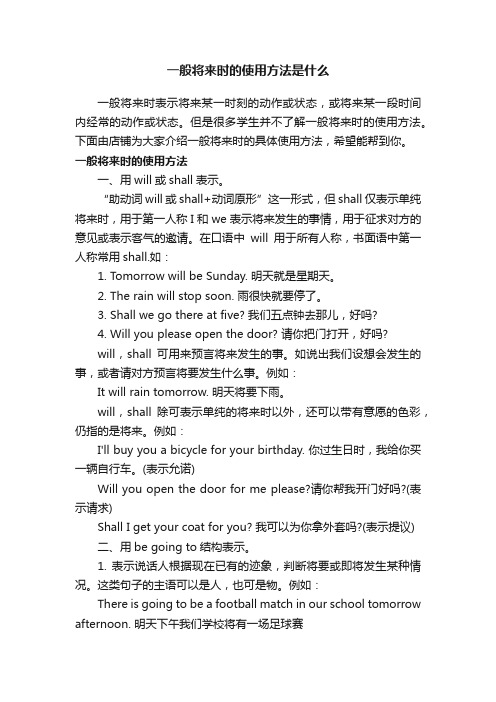
一般将来时的使用方法是什么一般将来时表示将来某一时刻的动作或状态,或将来某一段时间内经常的动作或状态。
但是很多学生并不了解一般将来时的使用方法。
下面由店铺为大家介绍一般将来时的具体使用方法,希望能帮到你。
一般将来时的使用方法一、用will或shall表示。
“助动词will或shall+动词原形”这一形式,但shall 仅表示单纯将来时,用于第一人称I和we表示将来发生的事情,用于征求对方的意见或表示客气的邀请。
在口语中will用于所有人称,书面语中第一人称常用shall.如:1. Tomorrow will be Sunday. 明天就是星期天。
2. The rain will stop soon. 雨很快就要停了。
3. Shall we go there at five? 我们五点钟去那儿,好吗?4. Will you please open the door? 请你把门打开,好吗?will,shall可用来预言将来发生的事。
如说出我们设想会发生的事,或者请对方预言将要发生什么事。
例如:It will rain tomorrow. 明天将要下雨。
will,shall除可表示单纯的将来时以外,还可以带有意愿的色彩,仍指的是将来。
例如:I'll buy you a bicycle for your birthday. 你过生日时,我给你买一辆自行车。
(表示允诺)Will you open the door for me please?请你帮我开门好吗?(表示请求)Shall I get your coat for you? 我可以为你拿外套吗?(表示提议)二、用be going to结构表示。
1. 表示说话人根据现在已有的迹象,判断将要或即将发生某种情况。
这类句子的主语可以是人,也可是物。
例如:There is going to be a football match in our school tomorrow afternoon. 明天下午我们学校将有一场足球赛(已有告示)I feel terrible.I think I'm going to die. 我感到难受极了,我想我快不行了。
一般将来时用法及例句

B. will going to be
C. is going to be
D. will go to be
( ) 2. Charlie
here next month.
A. isn’t working
B. doesn’t working
C. isn’t going to working
D. won’t work
B. will have
C. had
D. would have
( ) 11. He
her a beautiful hat on her next birthday.
A. gives
B. gave
C. will giving
D. is going to giving
( ) 12. He
to us as soon as he gets there.
A. writes
B. has written
C. will write
D. wrote
( ) 13. He
in three days.
A. coming back
B. came back
C. will come back 二、动词填空:
D. is going to coming back
2
1. I
A. not care B. be happy C. feel worried D. be unhappy
( )14. When you make s mistake, you should
A. keep quiet B. get aense of humor
( )15. The story tells us :“
三、句型转换: 1. People in the north often go skating in winter. (next winter)
一般将来时用法
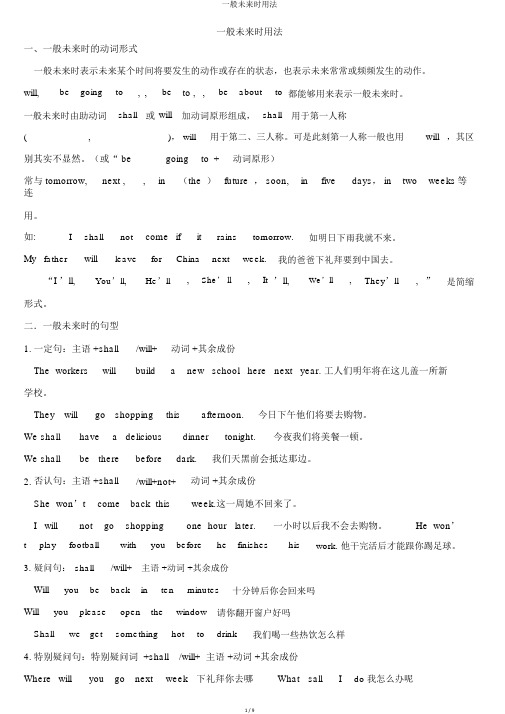
一般未来时用法一、一般未来时的动词形式一般未来时表示未来某个时间将要发生的动作或存在的状态,也表示未来常常或频频发生的动作。
will, be going to ,, be to ,, be about to 都能够用来表示一般未来时。
一般未来时由助动词shall 或will 加动词原形组成,shall 用于第一人称(____________,_______________), will 用于第二、三人称。
可是此刻第一人称一般也用will ,其区别其实不显然。
(或“ be going to +动词原形)常与 tomorrow,next ,, in(the)future , soon, in five days, in two weeks等连用。
如: I shall not come if it rains tomorrow. 如明日下雨我就不来。
My father will leave for China next week. 我的爸爸下礼拜要到中国去。
“I ’ll, You’ll, He’ll , She’ ll , It ’ll, We’ll , They’ll ,”是简缩形式。
二.一般未来时的句型1. 一定句:主语 +shall /will+ 动词 +其余成份The workers will build a new school here next year. 工人们明年将在这儿盖一所新学校。
They will go shopping this afternoon. 今日下午他们将要去购物。
We shall have a delicious dinner tonight. 今夜我们将美餐一顿。
We shall be there before dark. 我们天黑前会抵达那边。
2. 否认句:主语 +shall /will+not+ 动词 +其余成份She won’t come back this week.这一周她不回来了。
一般将来时用法总结
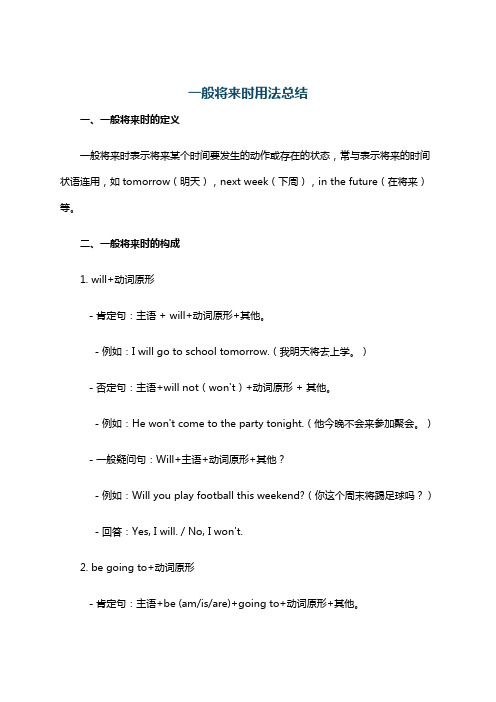
一般将来时用法总结一、一般将来时的定义一般将来时表示将来某个时间要发生的动作或存在的状态,常与表示将来的时间状语连用,如tomorrow(明天),next week(下周),in the future(在将来)等。
二、一般将来时的构成1. will+动词原形- 肯定句:主语 + will+动词原形+其他。
- 例如:I will go to school tomorrow.(我明天将去上学。
)- 否定句:主语+will not(won't)+动词原形 + 其他。
- 例如:He won't come to the party tonight.(他今晚不会来参加聚会。
) - 一般疑问句:Will+主语+动词原形+其他?- 例如:Will you play football this weekend?(你这个周末将踢足球吗?) - 回答:Yes, I will. / No, I won't.2. be going to+动词原形- 肯定句:主语+be (am/is/are)+going to+动词原形+其他。
- 例如:She is going to visit her grandparents next month.(她打算下个月去看望她的祖父母。
)- 否定句:主语+be (am/is/are)+not+going to+动词原形+其他。
- 例如:They are not going to have a meeting this afternoon.(他们今天下午不打算开会。
)- 一般疑问句:Be (am/is/are)+主语+going to+动词原形+其他?- 例如:Are you going to do your homework tonight?(你今晚打算做你的家庭作业吗?)- 回答:Yes, I am. / No, I'm not.三、一般将来时的用法1. 表示将来的计划或打算(be going to侧重于计划打算;will侧重于意愿)- I'm going to study hard this term.(我打算这个学期努力学习。
一般将来时的基本用法。
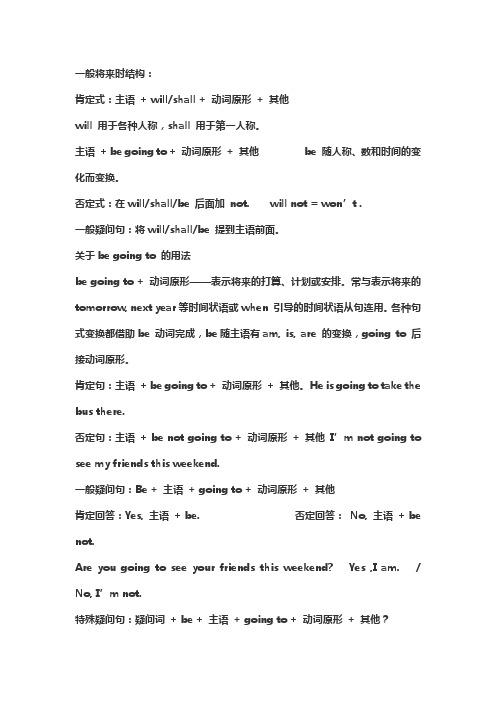
一般将来时结构:肯定式:主语+ will/shall + 动词原形+ 其他will 用于各种人称,shall 用于第一人称。
主语+ be going to + 动词原形+ 其他be 随人称、数和时间的变化而变换。
否定式:在will/shall/be 后面加not. will not = won’t .一般疑问句:将will/shall/be 提到主语前面。
关于be going to 的用法be going to + 动词原形——表示将来的打算、计划或安排。
常与表示将来的tomorrow, next year等时间状语或when 引导的时间状语从句连用。
各种句式变换都借助be 动词完成,be随主语有am, is, are 的变换,going to 后接动词原形。
肯定句:主语+ be going to + 动词原形+ 其他。
He is going to take the bus there.否定句:主语+ be not going to + 动词原形+ 其他I’m not going to see my friends this weekend.一般疑问句:Be + 主语+ going to + 动词原形+ 其他肯定回答:Yes, 主语+ be. 否定回答:No, 主语+ be not.Are you going to see your friends this weekend? Yes ,I am. / No, I’m not.特殊疑问句:疑问词+ be + 主语+ going to + 动词原形+ 其他?What is he going to do this weekend? When are you going to see your friends?2) 如果表示计划去某地,可直接用be going to + 地点We are going to Beijing for a holiday.3) 表示位置移动的动词,如go , come, leave 等常用进行时表示将来。
一般将来时态的结构和用法
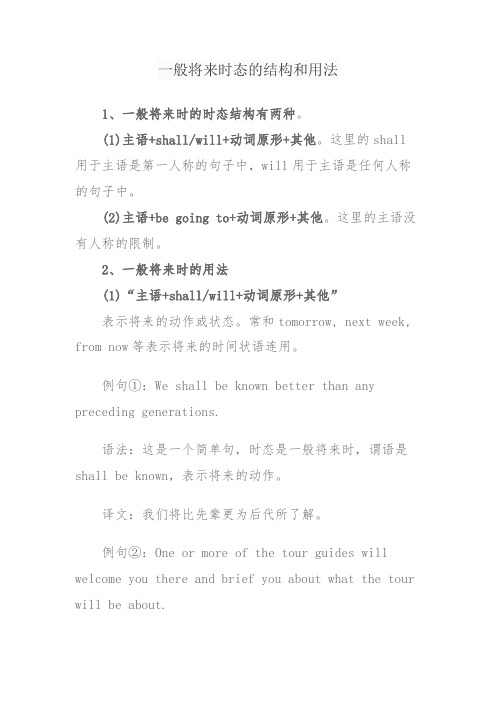
一般将来时态的结构和用法1、一般将来时的时态结构有两种。
(1)主语+shall/will+动词原形+其他。
这里的shall 用于主语是第一人称的句子中,will用于主语是任何人称的句子中。
(2)主语+be going to+动词原形+其他。
这里的主语没有人称的限制。
2、一般将来时的用法(1)“主语+shall/will+动词原形+其他”表示将来的动作或状态。
常和tomorrow, next week, from now等表示将来的时间状语连用。
例句①:We shall be known better than any preceding generations.语法:这是一个简单句,时态是一般将来时,谓语是shall be known,表示将来的动作。
译文:我们将比先辈更为后代所了解。
例句②:One or more of the tour guides will welcome you there and brief you about what the tour will be about.语法:这是一个主从复合句。
what引导的是宾语从句;主句和从句的时态都是一般将来时,谓语分别是will welcome…and brief和will be,表示将来的动作。
译文:有一个或几个导游会到那里迎接你们,并且向你们简要介绍参观的内容。
(2)“be going to+动词原形+其他”表示事先考虑过的将要发生的动作以及已有迹象表明必将要发生的某事,意为“打算,就要”。
例句:Now we go to Jane who is going to tell us about what's happening in town this weekend.语法:这是一个多重主从复合句。
who引导的是定语从句,该从句的时态是一般将来时,谓语是is going to tell;该定语从句中又包含一个由what引导的宾语从句,作介词about的宾语。
一般将来时的用法
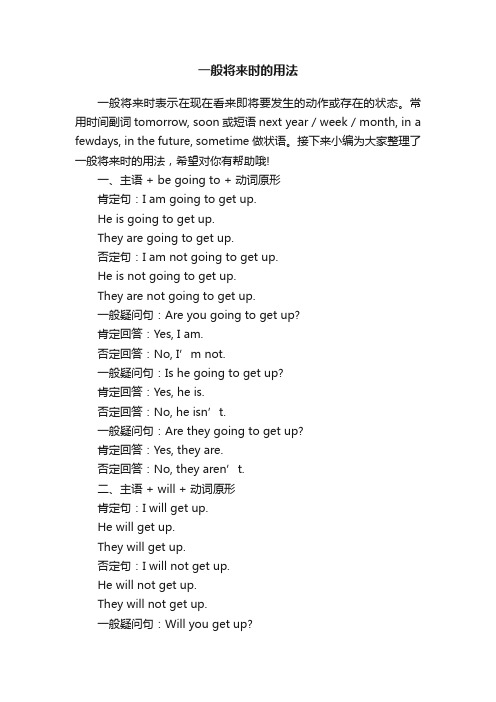
一般将来时的用法一般将来时表示在现在看来即将要发生的动作或存在的状态。
常用时间副词tomorrow, soon或短语next year / week / month, in a fewdays, in the future, sometime 做状语。
接下来小编为大家整理了一般将来时的用法,希望对你有帮助哦!一、主语 + be going to + 动词原形肯定句:I am going to get up.He is going to get up.They are going to get up.否定句:I am not going to get up.He is not going to get up.They are not going to get up.一般疑问句:Are you going to get up?肯定回答:Yes, I am.否定回答:No, I’m not.一般疑问句:Is he going to get up?肯定回答:Yes, he is.否定回答:No, he isn’t.一般疑问句:Are they going to get up?肯定回答:Yes, they are.否定回答:No, they aren’t.二、主语 + will + 动词原形肯定句:I will get up.He will get up.They will get up.否定句:I will not get up.He will not get up.They will not get up.一般疑问句:Will you get up?肯定回答:Yes, I will.否定回答:No, I won’t.一般疑问句:Will he get up.肯定回答:Yes, he will.否定回答:No, he won’t.一般疑问句:Are they going to get up?肯定回答:Yes, they are.否定回答:No, they aren’t.一般将来时/式(The Simple Future tense)时态定义be going to表主观的打算shall和will常常缩写成'll ,紧接在主语之后。
一般将来时的结构和用法

一般将来时的结构和用法【精选】
一般将来时基本结构:1、主语+will/shall+动词原形。
2、主语+am/is/are+going+to+动词原形。
3、主语+am/is/are+to+动词原形。
4、主语+am/is/are+现在分词。
5、主语+am/is/are+going to+动词原形。
1一般将来时用法:
1、一般将来时表示将要发生的动作或情况。
例如:I will(shall) arrive tomorrow.我明天到。
(主语是第一人称时最好用shall)
Will you be free tonight? 你今晚有空吗?
We won’t (shan’t) be busy this evening. 我们今晚不忙。
2、在一般将来时的句子中,有时有表示将来时间的状语,有时没有时间状语,这时要从意思上判断是否指未来的动作或情况。
例如:Will she come? 她(会)来吗?
3、在以第一人称I或we作主语的问句中,一般使用助动词shall,这时或是征求对方的意见,或是询问一个情况(b):
a. Where shall we meet? 我们在哪儿碰头?
b. Shall we have any classes tomorrow?明天我们有课吗?
在这类问句中,近几年来也有不少人用will,特别是在美国。
例如:
How will I get there? 我怎么去?。
一般将来时的基本用法

一般将来时的基本用法
1. 一般将来时可以用来表示计划呀!比如说,“我明天要去看电影”。
看,这就是我计划好的事情,这就是一般将来时的魅力所在呀,不是吗?
2. 它还能表达决定哟!就像“她决定下周去旅行”。
哇,一个决定就这样轻松地用一般将来时表达出来了呢!
3. 对未来的预测也少不了一般将来时呀!好比说“明天会下雨”。
这是不是很神奇,能对还没发生的事情做出预测呢!
4. 一般将来时还可以用在承诺上呢!像“我会好好爱你”。
多么温暖人心的承诺呀!
5. 表示即将要做的事也很棒呀!“火车马上要开了”。
紧张的感觉一下就有了呢!
6. 那种很肯定会发生的事也能用呀!例如“他明年一定会毕业”。
多明确呀!
7. 一般将来时在日常对话中也超常用呢!“你下班后要干什么”。
这不就是平常我们会问的问题嘛!
8. 它还能用来表达命令呢!“你明天必须把作业交上来”。
是不是感觉有点小压力啦!
9. 连愿望也可以用一般将来时呢!“我希望将来能成为一名科学家”。
这就是心中美好的憧憬呀!
总之,一般将来时真的太好用啦,在各种情境中都能发挥很大的作用呢!能表达这么多不同的意思,简直就是英语时态中的小明星呀!。
一般将来时的用法
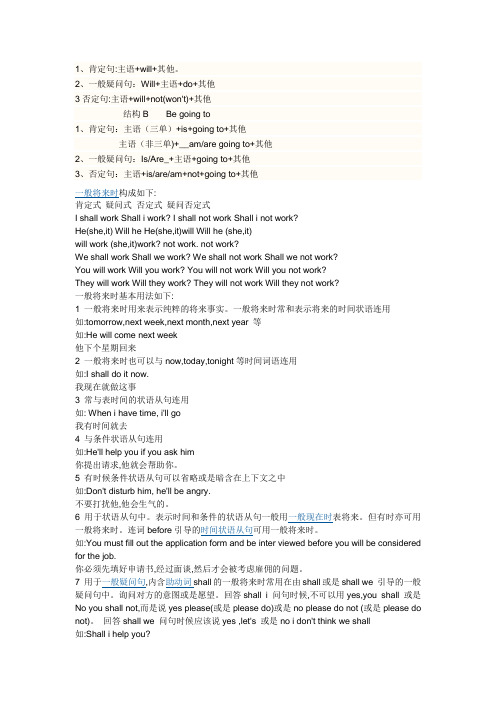
1、肯定句:主语+will+其他。
2、一般疑问句:Will+主语+do+其他3否定句:主语+will+not(won't)+其他结构B Be going to1、肯定句:主语(三单)+is+going to+其他主语(非三单)+__am/are going to+其他2、一般疑问句:Is/Are_+主语+going to+其他3、否定句:主语+is/are/am+not+going to+其他一般将来时构成如下:肯定式疑问式否定式疑问否定式I shall work Shall i work? I shall not work Shall i not work?He(she,it) Will he He(she,it)will Will he (she,it)will work (she,it)work? not work. not work?We shall work Shall we work? We shall not work Shall we not work?You will work Will you work? You will not work Will you not work?They will work Will they work? They will not work Will they not work?一般将来时基本用法如下:1 一般将来时用来表示纯粹的将来事实。
一般将来时常和表示将来的时间状语连用如:tomorrow,next week,next month,next year 等如:He will come next week他下个星期回来2 一般将来时也可以与now,today,tonight等时间词语连用如:I shall do it now.我现在就做这事3 常与表时间的状语从句连用如: When i have time, i'll go我有时间就去4 与条件状语从句连用如:He'll help you if you ask him你提出请求,他就会帮助你。
一般将来时的用法

一般将来时的用法一般将来时表示将来某一时刻的动作或状态,或将来某一段时间内经常的动作或状态。
一般将来时的用法有哪些呢?本文是店铺整理一般将来时的用法的资料,仅供参考。
一般将来时的用法一般将来时表示将来某一时刻的动作或状态,或将来某一段时间内经常的动作或状态.常常和表示将来的时间状语连用.如:tomorrow(明天),next week(下周),from now on(从现在开始);in the future(将来)等.一般将来时由助动词shall(第一人称),will(第二、三人称) 动词原形构成.美国英语则不管什么人称,一律用will.用法:(1)一般将来时表示将要发生的动作或情况.例如:I will(shall) arrive tomorrow.我明天到.Will you be free tonight?你今晚有空吗?We won’t (shan’t) be busy this evening.我们今晚不忙.(2)在一般将来时的句子中,有时有表示将来时间的状语,有时没有时间状语,这时要从意思上判断是否指未来的动作或情况.例如:Will she come?她(会)来吗?We’ll only stay for two weeks.我们只待两星期.The meeting won’t last long.会开不了多久.(3)在以第一人称I或we作主语的问句中,一般使用助动词shall,这时或是征求对方的意见(a),或是询问一个情况(b):a.Where shall we meet?我们在哪儿碰头?b.Shall we have any classes tomorrow?明天我们有课吗?在这类问句中,近年来也有不少人用will,特别是在美国.例如:How will I get there?我怎么去?(4)be going to 动词原形 a.表示计划、打算、准备做的事.例如:We are going to put up a building here.我们打算在这里盖一座楼.How are you going to spend your holidays?假期你准备怎样过?b.表示即将发生或肯定要发生的事.例如:I think it is going to snow.我看要下雪了.There’s going to be a lot of trouble about this.这事肯定会有很多麻烦.一般将来时的其他用法一般将来时表示将来某一时刻的动作或状态,其表达形式除了“shall(第一人称),will(第二、三人称)+动词原形构成”外,还有以下几种形式.一.“be going to+动词原形”表示即将发生的或最近打算进行的事.例如:①It is going to rain.要下雨了.②We are going to ha ve a meeting today.今天我们开会.二.go,come,start,move,sail,leave,arrive,stay,live,fly,等可用进行时态表示按计划即将发生的动作,例如:I'm leaving for Beijing.我要去北京.三.“be to+动词原形”表示按计划要发生的事或征求对方意见.例如:①Are we to go on with this work?我们继续干吗?②The boy is to go to school tomorrow.这个男孩明天要去上学.四.“be about to+动词原形”表示即将发生的动作,意为:很快,马上.后面一般不跟时间状语.例如:We are about to leave.我们马上就走.五.某些词,如come,go,leave,arrive,start,get,stay ,live,fly等的一般现在时也可表示将来.①The meeting starts at five o'clock.会议五点开始.②He gets off at the next stop.他下一站下车.六.“be due to"构成的谓语,意味“定于…”也可表示将来时.百度百科上有详细介绍,很全面的哦.一般将来时基本用法一般将来时构成如下:肯定式疑问式否定式疑问否定式I shall work Shall i work? I shall not work Shall i not work? He(she,it) Will he (she,it) He(she,it)will not Will he (she,it) not We shall work Shall we work? We shall not work Shall we not work? You will work Will you work? You will not work Will you not work? They will work Will they work? They will not work Will they not work?其结构有如下几种: 1)will + 动词原形(will可以用于任何人称) 需要注意的是当主语是第一人称时will可以换成shall,特别是在以I或we 作主语的问句中,一般用shall. 例. Shall we go to the zoo? 2)be going to +动词原形第一种结构的句式变化是: 变否定句在will后边加not. 变一般疑问句把will提前. e.g. She will come back in three days. She will not come back in three days. Will She come back in three days? 第二种结构的句式变化要在be上做文章. E.g. They are going to clean their classroom. They are not going to clean their classroom. Are they going to clean their classroom?一般将来时基本用法如下:1 一般将来时用来表示纯粹的将来事实。
一般将来时用法

一般将来时用法一、一般将来时的动词形式一般将来时表示将来某个时间将要发生的动作或存在的状态,也表示将来经常或反复发生的动作。
will, be going to …, be to…, be about to都可以用来表示一般将来时。
一般将来时由助动词shall或will加动词原形构成,shall用于第一人称(____________,_______________),will用于第二、三人称。
但是现在第一人称一般也用will,其区别并不明显。
(或“be going to + 动词原形)常与tomorrow, next… , in (the) future,soon, in five days,in two weeks等连用。
如: I shall not come if it rains tomorrow. 如明天下雨我就不来。
My father will leave for China next week. 我的爸爸下星期要到中国去。
“I’ll, You’ll, He’ll , She’ll , It’ll, We’ll , They’ll …”是简缩形式。
二.一般将来时的句型1.肯定句:主语+shall /will+动词+其他成份The workers will build a new school here next year.工人们明年将在这儿盖一所新学校。
They will go shopping this afternoon. 今天下午他们将要去购物。
We shall have a delicious dinner tonight. 今晚我们将美餐一顿。
We shall be there before dark. 我们天黑前会到达那里。
2.否定句:主语+shall /will+not+动词+其他成份She won’t come back this week.这一周她不回来了。
I will not go shopping one hour later. 一小时之后我不会去购物。
- 1、下载文档前请自行甄别文档内容的完整性,平台不提供额外的编辑、内容补充、找答案等附加服务。
- 2、"仅部分预览"的文档,不可在线预览部分如存在完整性等问题,可反馈申请退款(可完整预览的文档不适用该条件!)。
- 3、如文档侵犯您的权益,请联系客服反馈,我们会尽快为您处理(人工客服工作时间:9:00-18:30)。
般将来时用法般将来时的动词形式一般将来时表示将来某个时间将要发生的动作或存在的状态,也表示将来经常或反复发生的动作。
will, be going to ,, be to ,, be about to 都可以用来表示一般将来时。
一般将来时由助动词shall 或will 加动词原形构成,shall 用于第一人称(, ,) will 用于第二、三人称。
但是现在第一人称一般也用will ,其区别并不明显。
(或“ be going to + 动词原形)常与tomorrow, next , , in (the )future ,soon, in five days ,in two weeks 等连用。
如: I shall not come if it rains tomorrow. 如明天下雨我就不来。
My father will leave for China next week. 我的爸爸下星期要到中国去。
“I'll, You 'll, He 'll , She 'll , It 'll, We 'll , They 'll , ”是简缩形式。
二.一般将来时的句型1.肯定句:主语+shall /will+ 动词+其他成份The workers will build a new school here next year. 工人们明年将在这儿盖一所新学校。
They will go shopping this afternoon. 今天下午他们将要去购物。
We shall have a delicious dinner tonight. 今晚我们将美餐一顿。
We shall be there before dark. 我们天黑前会到达那里。
2.否定句:主语+shall /will+not+ 动词+其他成份She won ' t come back this week. 这一周她不回来了。
I will not go shopping one hour later. 一小时之后我不会去购物。
He won 't play football with you before he finishes his work. 他干完活后才能跟你踢足球。
3.疑问句:shall /will+ 主语+动词+其他成份Will you be back in ten minutes? 十分钟后你会回来吗?Will you please open the window? 请你打开窗户好吗?Shall we get something hot to drink? 我们喝一些热饮怎么样?4.特殊疑问句:特殊疑问词+shall /will+ 主语+动词+其他成份Where will you go next week? 下星期你去哪? What sall I do? 我怎么办呢?How many books will they get? 他们将有多少本书?三.will, be going to ,, be to ,, be about to , 的区别1.be going to +V 原,表示将来。
表示打算、准备做的事或即将发生或肯定要发生的事。
be going to 和will 相比,be going to 通常表示主观,will 通常表示客观。
What are you going to do tomorrow? 明天你要做什么?Look at the dark clouds, there is going to be a storm. 看看这些黑云,将有一场暴风雨。
It ' s going to be a fine day tomorrow. 明天将会是个好天。
It is going to rain. 要下雨了。
2.“be to+ 动词原形”表示按计划要发生的事或征求对方意见。
这种结构表示计划中约定的或按职责、义务要求必须去做的事或即将发生的动作。
We are to have a meeting next Saturday. 下个周日我们有个会。
The boy is to go to school tomorrow. 这个男孩明天要去上学。
Are we to go on with this work? 我们继续干吗?The president is to visit China next week. 总统下周来访中国。
3.“be about to+ 动词原形”表示即将发生的动作,意为:很快,马上。
后面一般不跟时间状语。
这一结构用于表示客观就要发生的事,表示马上就要发生。
一般不再与时间状语连用。
Don 't go out. We 're about to have a meeting. 别出去了, 我们很快就开会了。
I was about to start when it began to rain. 我刚要出发就下起雨来了。
He is about to leave for Shenyang. 他将要离开去沈阳。
We are about to leave. 我们马上就走。
四.注意事项1.be about to 不能与tomorrow, next week 等表示明确将来时的时间状语连用。
2.Let ' s , 的附加疑问通常使用“,, shall we ? ”。
Let 's have a rest, shall we?3.问句是“ Shall ,?”,答句就用“ shall ~ ”;问句用“ Will , ?”,答句就用“ will ~ ”。
要前后保持一致。
Shall you go to school next week ? Yes, I shall . We 'll have an exam . Will you have an exam tomorrow? Yes, I will. / No, I won 't.4,某些表示位移的动词如:come ,go, leave, arrive, start, get,fly 等,用现在进行时表示将来时。
Uncle wang is coming. 王叔叔就要来了。
They 're leaving for Beijing. 他们就要去北京了。
5,在时间状语从句,条件状语从句,让步状语从句中,主句是一般将来时,从句用一般现在时替代一般将来时,简称“主将从现” 。
When I grow up, I 'll be a nurse and look after the patients. 当我长大的时候,我将成为一名护士照顾病人。
I 'll do it better if the teacher gives me anther chance. 如果老师再给我一次机会,我会做得更好。
一般将来时专项练习一、单项选择。
( ) 1. There __________ a meeting tomorrow afternoon.A.will be going toB. will going to beC. is going to beD. will go to be( ) 2. Charlie ________ here next month.A. isn 'tworkingB. doesn 'tworkingC. isn 'tgoing to workingD. won't work( ) 3. He _________ very busy this week, he ______ free next week.A.will be; isB. is; isC. will be; will beD. is; willbe( ) 4. There _________ a dolphin show in the zoo tomorrow evening.A. wasB. is going to haveC. will haveD. is going to be()5. - _________ y ou __________ free tomorrow? - No. I ____________ free the day after tomorrowA. Are; going to; willB. Are; going to be; willC. Are; going to; will beD. Are; going to be; will be( ) 6. Mother ________ me a nice present on my next birthday.A. will givesB. will giveC. givesD. give()7. - Shall I buy a cup of tea for you? _________ . (不,不要。
)A. No, you won't.B.No, you aren 't.C.No, please don't.. No, please.()8. - Where is the morning paper? -I _________ if for you at once.A. getB. am gettingC. to getD. will get( ) 9. ________ a concert next Saturday?A. There will beB. Will thereC. There can beD. There beare( ) 10. If they come, we _______ a meeting.( ) 11. He ________ her a beautiful hat on her next birthday. A. gives B. gaveC. will givingD. is going to giving( ) 12. He ________ to us as soon as he gets there.A. writesB. has writtenC. will writeD. wrote ( ) 13. He ________ in three days.A. coming backB. came backC. will come backD. is going to coming back ( ) 14. If it _____ tomorrow, we' ll go roller-skating. A. isn 'train B.won'trainC. doesn 'trainD.e ()15.— Will his pare nts go to see the Terra Cotta Warriors tomorrow?—_ (不去) .A. they willn ' t.B. they won' t.C. they aren 't.y don ' t.( ) 16. Who _________ we ________ sw i m m i n g with tomorrow afternoon?A. will; goB. do; goC. will; goingD. shall; go( ) 17. We ________ the work this way next time.A. doB. will doC. going to doD. will doing( ) 18. Tomorrow he _________ a kite in the open air first, and then __ boating in the p ark.A. will fly; will goB. will fly; goesC. is going to fly; will goesD. flies; willA. haveB. will haveC. hadD. would havedoesn 'tfinNo, ________D. thego( ) 19. The day after tomorrow they _______ a volleyball match.going to be( ) 21. They ________ an English evening next Sunday.is going to have( ) 22. ________ you _________ free next Sunday?A. Will; areB. Will; beC. Do; beD. Are; be( ) 23. He ________ there at ten tomorrow morning.A. willB. isC. will beD. be( ) 24. ________ your brother _______ a magazine from the library?A. Are; going to borrowB. Is; going to borrowC. Will; borrowsD. Are; going to borrows ()25. - Shall I come aga in tomorrow after noon?- ________ (好的)A. Yes, pleaseB. Yes, you will.C. No, please.D. No,, 丄 you won ' t.( ) 26. It _______ the year of the horse next year.( ) 27. ________ open the window?A. will watchingB. watches going to watch( ) 20. There ________ a birthday party this Sunday.A. shall beB. will beC. is watchingD. isC. shall going to beD. willA. are havingB. are going to haveC. will havingD.A. is going to beB. is going toC. will beD. will is8. I am afraid there ____be )a meeting this afternoon. I cant join you.Do you()28. - Let s go out to play football, shall we?- OK. I _________ .A. will comingB. be going to comeC. comeD. am coming( ) 29. It ____ us a long time to learn English well.A. takesB. will takeC. spendsD. will spend( ) 30. The train _____ at 11.A. going to arriveB. will be arriveC. is going toD. is arriving二、动词填空。
